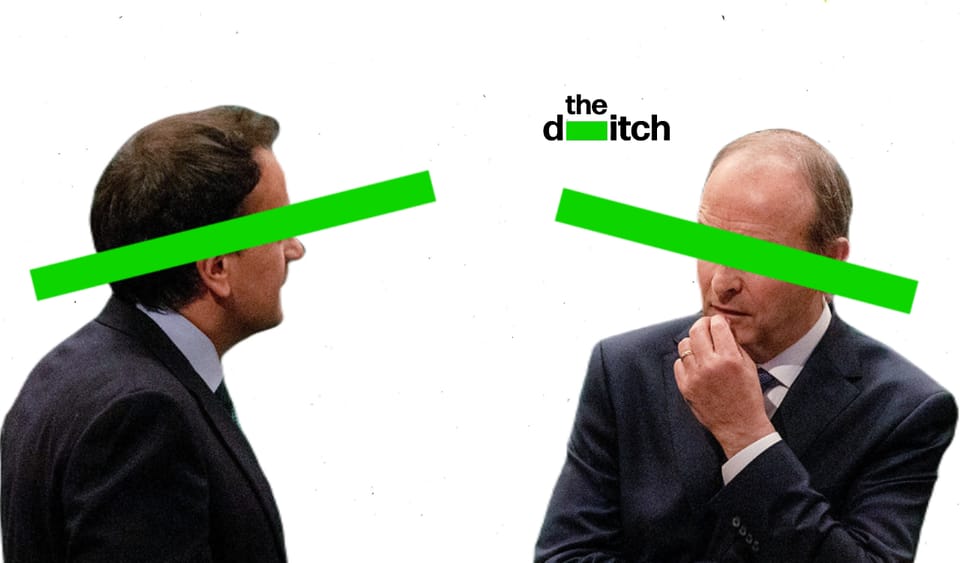That's football guys. That's all it is. Now, what are you gonna do?
- Tony D'Amato
Years back I was at a dinner with a few very serious journalists. Sinn Féin came up. One of the journalists, now a senior government adviser, spoke of a former government minister with whom he was acquainted. This former minister, a critic of Sinn Féin, had seen things, secret things, things you’d barely believe, during his time in cabinet about the republicans that proved it isn’t a normal party.
‘Oh yeah? Like what?’
‘Oh he wouldn’t say!’
Right so.
Nice dinner, enjoyed the tuna tartare.
That denunciation, casual and unexplained, is central to both the anti-republican state’s mythos and the ruling class’s grip on its levers. It’s illustrative of why we’ve had more than a century of rule from the right wing so-called Civil War parties. The people who hoist successful Fine Gael and Fianna Fáil party candidates onto their shoulders in count centres need to believe the men and women they carry are different to those in the other party; they also need to believe their counterparts who campaigned for republicans, who knocked on the same doors as they did, are in some way abnormal, illegitimates they can rely on the state to denigrate.
Their parties need these people to believe this too. What an insult to their members when they declared the Civil War over in summer 2020 after realising it was the only way to maintain their hold on government.
With a general election on the way – and everyone around Leinster House so excited about it – Sinn Féin, not long ago the country’s government in waiting according to received wisdom, is enduring the latest in the campaign to prove its abnormality.
Last year its former Seanad leader Niall Ó Donnghaile sent inappropriate text messages to a 16-year-old fellow party member and was suspended. Mary Lou McDonald paid tribute to him. And she’s been rightly criticised for it. “If anything could make the situation worse, Mary Lou McDonald’s glowing tribute to Niall felt like a mental stab,” said the teenager who received the texts.
Up north two Sinn Féin press officers resigned after they gave employment references for a colleague under investigation for – and who would later plead guilty to – child sex offences.
Brian Stanley has resigned from the party after what McDonald called a "very serious" complaint about his "personal behaviour". Stanley with neck accused Sinn Féin of running a kangaroo court against him – how he knew two things: what that remark would signify to those who don’t like his former party; and the facts of the complaint against him, which was upheld. He said his treatment shows "the level of double standards that now operate and pertain in Sinn Féin".
The three scandals are all too normal to Fine Gael, Fianna Fáil and the parties that historically support them in government. No matter. They were rendered as unique to Sinn Féin.
Micahel McDowell in the Irish Times, always reliable for reminding his public what the party really is, said “Sinn Féin not a conventional political party; it is a tightly controlled revolutionary movement still in the grip of a very small group many of whom were active in the IRA’s campaign of violence.” Micheál Martin was shocked. “The party’s track record of concealment and secrecy is shocking,” he said. Distinct from other parties, for Martin, “It is apparent when it comes to Sinn Fein, the party always comes first.”
Sometimes implicit, other times explicit, establishment condemnations of Sinn Féin attack the party’s legitimacy and suggest it’s a subversion of what we call Irish democracy. “This is the piece of theatre – of constantly declining quality – that each election now reproduces,” as Jacques Rancière said. It is however this cynical undermining of Sinn Féin’s normality, rather than criticism of policy, that actually threatens Irish democracy. If you want abnormal: how about a supposed multi-party democracy that’s returned the same two (and a half) right wing parties for its entire history.
‘From Ballyseedy to section 31, from the Special Criminal Court to the present day’
Chantal Mouffe, a theorist (and proponent) of populism rather than someone who uses the word for everything she doesn’t like, in For a Left Populism wrote of the need for liberal-demoratic regimes to recognise and respect pluralism. Democracy must, for Mouffe, “enable the agonistic expression of conflict, which requires that citizens genuinely have the possibility of choosing between real alternatives. A well-functioning democracy calls for a confrontation of democratic political positions.”
Mouffe recognised the importance of conflict in politics but stressed it should occur between adversaries rather than enemies.
“What is important is that conflict when it arises does not take the form of an ‘antagonism’ (struggle between enemies) but of an ‘agonism’ (struggle between adversaries). The agonistic confrontation is different from the antagonistic one, not because it allows for a possible consensus, but because the opponent is not considered an enemy to be destroyed but an adversary whose existence is perceived as legitimate. Her ideas will be fought with vigour but her right to defend them will never be questioned,” she wrote.
This simple right, to defend ideas, hasn’t been upheld in Ireland. The southern state was founded to exclude republicans and its organs have been shaped and reshaped to advance this dogma. There’s a throughline from Ballyseedy to section 31, from the establishment of the Special Criminal Court to the present day.
Section 31 of the Broadcasting Act gave government the power to dictate to the state broadcaster what it could and couldn’t publish. It wasn’t until 1994 that a broadcast ban on proscribed organisations, including Sinn Féin, was lifted. A joint SIPTU-NUJ challenge to the European Court of Justice and small pockets of resistance aside, Irish media accepted the legislation. “At RTÉ, the censorious section 31 was regarded less as an imposition than as an article of faith, and the mentality was implanted in other outlets,” wrote Harry Browne in Magill.
It needs to be said: section 31 wasn’t moral; it was political. The man most associated with it, Conor Cruise O’Brien, considered it less a judgement on what he considered terrorism but rather a tactic to defeat an opponent during a time of potential unrest. "If the Provos are successful, there will be civil war into which the south will be drawn," he said. Its effect was to encircle those the southern state considered legitimate and exclude others.
The provision is now history but the politics that brought it about persist. How could they not? It would be foolish to think that, when a piece of legislation is stricken from the books, the forces that brought it about similarly disappear. All those journalists, all those editors, homogenous, with the same class interests and same learnt values, many of whom still working today in the same newsrooms, still endorsing the tedious Good IRA-Bad IRA rubric, as well as carrying the memory of the times they complied when the state told them who was worthy of respect and consideration. (We receive reminders about whom from the northern conflict is considered human and grievable: a recent Irish Independent headline asked, “Where is Robert Nairac?” the only answer to which is another question – which part?)
‘Really bad guys’
We no longer have a written section 31. We still have the Special Criminal Court.
In January 2020, just before the country’s last general election, which delivered a surprisingly good result for Sinn Féin, Leo Varadkar reached for an old favourite. He ruled out Fine Gael going into government with Sinn Féin, the obverse of which Mary Lou McDonald still fails to pledge.
“It is our view Sinn Féin is not a normal party. Their decision-making process involves consulting with an ard chomhairle and we have seen that in Northern Ireland where key decisions are not necessarily made by elected politicians." Part of the problem for Varadkar was the party’s position on the Special Criminal Court. “Sinn Féin is a party that has consistently opposed the Special Criminal Court, a court that we use to lock up some really bad guys, dissident Republicans and people who are involved in organised crime," he said.
“Really bad guys.”
All politics, ideology, conflict – history itself – collapsed, flattened. The Special Criminal Court went after, goes after, really bad guys.
On the death of Des O’Malley, who established the court, Varadkar’s party colleague and then junior justice minister Hildegarde Naughton did a better job of recognising these politics. “As minister for justice, Des O’Malley protected the state during one of its most difficult and dangerous periods. He showed great courage in facing down those who threatened not just the state, but also the safety of him personally and that of his family. Des O’Malley also ensured that the state was equipped to take on the subversives and paramilitaries through the Special Criminal Court,” she said.
As Naughton acknowledged, Ireland in 1972 established the Special Criminal Court, during the northern conflict, as a means to target, with juryless courts, those it considered subversives and threats to the state. It was founded to help legally codify those who were inside and outside. The court remains in place, an affront to human rights and liberal catechism, with the United Nations and Amnesty International among its critics. Sinn Féin has unfortunately begun equivocating on the court, abstaining from a recent Dáil vote on its existence. Is the party’s position now that the court – its disavowal of human rights and incompatibility with the rule of law – was required to put those “really bad guys” away?
It’s been more than 100 years of it and it’s to be expected. Any democratic system, including the one we have in Ireland, will by design identify and prioritise the class of people it considers not just worthy, but legitimate, their counterparts illegitimate. This class takes Fine Gael and Fianna Fáil for its political representation. Both parties are willing to indulge the state’s foundational mythology, as well as weaponise its institutions, to maintain power. Breaking their stranglehold is an historic necessity, an historic inevitability, that will come, likely not with this upcoming general election, but some time.
Sinn Féin for its part needs to disabuse itself of the idea it will be allowed to be just another technocratic, managerialist social democratic party like British Labour, allowed intermittently to take the reins when conditions demand it.
Because the Free State won’t give them up easy.


